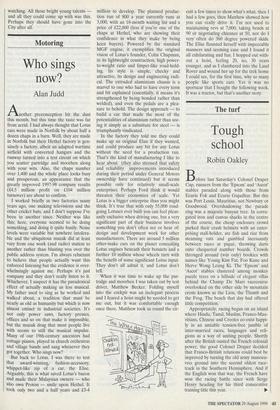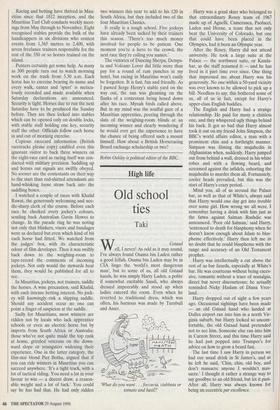The turf
Tough school
Robin Oakley
Before last Saturday's Colonel Draper Cup, runners from the 'Epsom' and `Ascot' stables paraded along with those from Ecurie Fok and Ecurie Gujadhur. But this was Port Louis, Mauritius, not Newbury or Goodwood. Overshadowing the parade ring was a majestic banyan tree. In corru- gated iron and canvas shacks in the centre of the course, the cheap enclosure crowd parked their crash helmets with an enter- prising stall-holder, ate fish and rice from steaming vats and gambled incessantly between races at piqué, throwing darts onto chequered number boards. Crowds thronged around (win only) bookies with names like Young Kim Fat, Foo Kune and Herve Wong Leung Ki. The `Epsom' and `Ascot' stables clustered among monkey pi1771e trees on a hillside of elegant villas behind the Champ De Mars racecourse overlooked on the other side by mountain crests known as the Lion, the Thumb and the Frog. The beach that day had offered little competition.
Appropriately, racing began on an island where Hindu, Tamil, Muslim, Franco-Mau- ritians, Chinese and Creoles co-exist happi- ly in an amiable tension-free jumble of inter-married races, languages and reli- gions as a way of uniting people. Shortly after the British ousted the French colonial power, the good Colonel Draper decided that Franco-British relations could best be improved by turning the old army manoeu- vres ground into the second oldest race- track in the Southern Hemisphere. And if the English won that war, the French have won the racing battle since with Serge Henry heading for his third consecutive training title this year. ► Racing and betting have thrived in Mau- ritius since that 1812 inception, and the Mauritius Turf Club conducts weekly meet- ings from May through to November. Eight recognised stables provide the bulk of the handicappers in six divisions who contest events from 1,365 metres to 2,400, with seven freelance trainers responsible for the rest of the 350 or so horses trained on the island.
Punters certainly get some help. As many as 300 people turn out to watch morning work on the track from 5.30 a.m. Each horse has to exercise bearing its name and every walk, canter and 'spurt' is meticu- lously recorded and made available when Saturday declarations are announced. Security is tight. Horses due to run the next Saturday have to be produced the Sunday before. They are then locked into stables which can be opened only on double locks, with stable staff holding one key, security staff the other. Officials follow each horse in and out of morning exercise.
Copious racecard information (British racetracks please copy) enabled even this ignorant visitor to back three winners on the eight-race card as racing itself was con- ducted with military precision. Saddling up and horses out signals are swiftly obeyed. No sooner are the contestants on their way to the start than red-shirted attendants are hand-whisking loose straw back into the saddling boxes.
I watched a couple of races with Khalid Rawat, the generously welcoming and nee- dle-sharp clerk of the course. Before each race he checked every jockey's colours, sending back Australian Gavin Howes to change. In the parade ring he was noting not only that blinkers, visors and bandages were as declared but even which kind of bit each horse had fitted. We watched from the judges' box, with its characteristic odour of film developer. Then it was swiftly back down to the weighing-room to tape-record the comments of incoming jockeys. Not only would the stewards hear them, they would be published for all to see.
In Mauritius, jockeys, not trainers, saddle the horses. A wise precaution, said Khalid, with such intense betting interest. No jock- ey will knowingly -risk a slipping saddle. Should any accident occur no one can point a finger of suspicion at the saddle.
Sadly for Mauritians, most winners are ridden not by locals who lack apprentice schools or even an electric horse but by imports from South Africa or Australia: those who've not quite made the top rank at home, grizzled veterans on the down- ward slope or youngsters widening their experience. One in the latter category, the film-star blond Piet Botha, argued that if you can ride winners in Mauritius you can succeed anywhere. 'It's a tight track, with a lot of tactical riding. You need a lot in your favour to win — a decent draw, a reason- able weight and a lot of luck.' You could say he has had that. He had only ridden two winners this year to add to his 120 in South Africa, but they included two of the four Mauritian Classics.
It really is a tough school. Five jockeys have already been sacked by their trainers this season. 'There's too much money involved for people to be patient. One moment you're a hero to the crowd, the next race they're calling you names.'
The victories of Dancing Sherpa, Demps- ta and Volcano Lover did little more than pay for a round of rum punches in my hotel, but racing in Mauritius won't easily be forgotten. It is fast, fun and friendly. As I passed Serge Henry's stable yard on the way out, the sun was gleaming on the flanks of a contestant being hosed down after his race. Mynah birds called above. But in my mind was the soulful gaze of a Mauritian apprentice, peering through the slats of the weighing-room blinds at an incoming winner and clearly wondering if he would ever get the experience to have the chance of being offered such a mount himself. How about a British Horseracing Board exchange scholarship or two?
Robin Oakley is political editor of the BBC.



























































 Previous page
Previous page